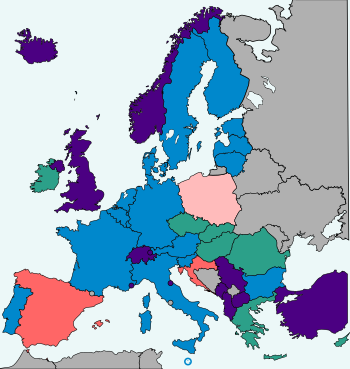Unified Patent Court

Logo of the UPC
|
|
| Formation | To be established by treaty |
|---|---|
| Type | Intergovernmental organization, court of several EU member states |
| Legal status | Proposed |
| Headquarters |
Paris (court of first instance, central division) Luxembourg (court of appeal and registry) |
| Website | Unified Patent Court official website |

|
|
| Type | Intergovernmental agreement |
|---|---|
| Signed | February 19, 2013 |
| Location | Brussels, Belgium |
| Effective | Not in force |
| Condition | Amendment of the Brussels I Regulation, ratification by the 3 largest patent granting states (presently France, Germany, United Kingdom), and ratification by at least 13 states in total. |
| Signatories | 25 EU member states (All except: Croatia, Poland and Spain) |
| Ratifiers | 12 |
| Depositary | General Secretariat of the Council of the European Union |
| Languages | English, German and French |
|
|
|
The Unified Patent Court (UPC) is a proposed common patent court open for participation of all member states of the European Union. The Court will hear cases regarding infringement and revocation proceedings of European patents (including unitary patents) valid in the territories of the participating states, with a single court ruling being directly applicable throughout those territories. Requesting unitary patents upon the grant of certain European patents will be possible from the establishment of the UPC. The Court is to be established by the Agreement on a Unified Patent Court, which was signed as an intergovernmental treaty in February 2013 by 25 states (all EU member states except Spain, Poland and Croatia). It will enter into force on the first day of the fourth month after meeting three predefined conditions. The UPC comprises a Court of First Instance, a Court of Appeal in Luxembourg, an Arbitration and Mediation Center and a common Registry. The Court of First Instance will consist of a central division in Paris (with thematic sections in London and Munich) along with several local and regional divisions.
European patents are granted by the European Patent Office under the 1973 European Patent Convention. 38 countries (including all countries of the European Union) are parties to the Convention. After grant, a European patent essentially becomes "a bundle of national patents" (subject, in some countries, to translation requirements in an official language of that country) in all countries separately, after which renewal fees are also due in all countries. Infringement procedures in one country have essentially no effect in others, which sometimes leads to multiple lawsuits regarding the same European patent in different countries; sometimes leading to different results. To reduce translation and litigation costs, the European Union has passed legislation regarding European patents with unitary effect. Registration of unitary effect is to be organized by the European Patent Office and is expected to result in limited translation requirements and a single renewal fee for the whole territory. As Spain and Italy objected to the translation requirements (featuring only the European Patent Convention languages English, German and French), they did not originally participate in the regulation, which was thus been organized as an enhanced cooperation mechanism between member states, though Italy subsequently joined. Unitary patent protection however also requires a uniform litigation system, provided for with the Unified Patent Court, constituted with the Agreement on a Unified Patent Court, signed on 19 February 2013. The Agreement also incorporates many of the provisions of the proposed European Patent Litigation Agreement.
...
Wikipedia
